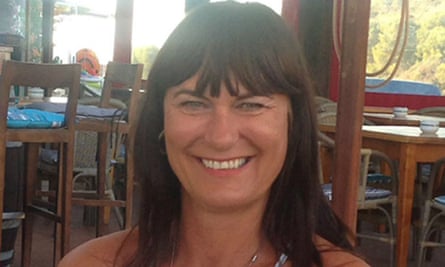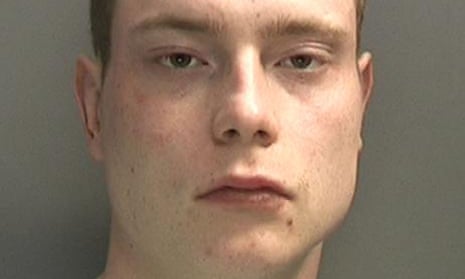A homeless man who turned on the woman who tried to help him and killed her and her teenage son has been jailed for life with a minimum term of 30 years.
Aaron Barley stabbed Tracey Wilkinson 17 times and inflicted eight knife wounds on her son, Pierce, after sneaking into their home in Stourbridge, West Midlands, dressed in a balaclava.
Barley, who was given food, friendship and shelter by the family, also tried to kill Wilkinson’s husband, Peter, when he returned home after walking the dog.
Jailing Barley, Mrs Justice Carr told him he had carried out “a vicious and unprovoked attack” in the home where he had once been welcomed. She said he had gone to the house and “lay in wait” in the garden before creeping inside the unlocked home, going upstairs and launching a “violent and sustained assault, involving severe force”.
The 24-year-old, sitting in the dock at Birmingham crown court on Wednesday, did not react when told he “may never be released”, after admitting two counts of murder and another of attempted murder.
The judge told Barley: “You abused your knowledge of the family home, which you had only gained through the Wilkinsons’ extraordinary kindness and generosity to you. Mrs Wikinson and Pierce, only 13, were in bed at home, where they were entitled to feel, and should have been, safe.
“You have shown no remorse – indeed you only regret that Mr Wilkinson survived his injuries – and at times [you have shown] satisfaction in what you did achieve. You knew that you were destroying the family. It is what you intended.
“Your conduct involved a very significant degree of planning and premeditation, at least so far as the attack on Mr Wilkinson was concerned. You broke into the grounds of the house in the very early hours. You emerged from the garden in black disguise, even covering your coloured trainers with black socks.”
The judge added: “The Wilkinson family, and in particular Mrs Wilkinson, had done nothing but their best to help you. Mr and Mrs Wilkinson were both financially and emotionally generous to you. You betrayed their trust in every way, exploiting the knowledge of their household.”

She said: “It is difficult to imagine what went through Mrs Wilkinson and Pierce’s minds when you attacked them but they must have been bewildered and terrified. One of them, at least, must have been aware of the stabbing of the other.”
Birmingham crown court heard that Tracey Wilkinson, 50, took pity on Barley, when she found him huddled in a cardboard box outside a supermarket in September 2016. She drove him home and gave him her husband’s dinner. The family helped Barley find accommodation and made sure he had a hot meal every night.
Peter Wilkinson, 47, gave Barley a job at his company but had to sack him after he began taking drugs.
Last year Barley spent Christmas Day with the family, including their daughter, Lydia, and wrote Tracey Wilkinson a card addressed: “To the mother that I never had.” When he lost his accommodation the family allowed him to stay with them for two weeks.
At the end of March this year Barley arrived at the family home dressed in black and armed with a knife. He killed Tracey Wilkinson in her bed and her 13-year-old son in his room. When Peter Wilkinson returned Barley leapt out of a garden shed, where he had been hiding, and attacked him. Barley stabbed Wilkinson six times before fleeing in his victim’s Land Rover.
Barley’s motive remains unknown. He refused to give an explanation to the police and would not allow toxicology tests to be done, meaning it is not known if he had been drinking or taking drugs.

The court heard that psychiatric reports had found nothing that could have provided him with a defence of diminished responsibility.
Barley rocked from side to side as details of his 21 previous convictions for offences including an assault on a former partner were read out.
Volunteers at an alcohol and drug rehabilitation centre have reported that Barley said he wanted to kill someone with a knife – with his “two aims in life” being to kill a police officer and a prison officer. But his remarks were dismissed as bravado caused by drug abuse.
It also emerged in court that he was reported to police after Barley’s former foster carer became concerned about messages posted on Facebook. Among the posts was a threat made by Barley against “my family that have not spoken to me in years” and messages raising the possibility of a “killing spree”.
Less than a week before the stabbings, the court heard, the Wilkinsons cancelled a mobile phone contract they had paid for for Barley. At around the same time Tracey Wilkinson had told a friend she had seen Barley looking over a fence at her home and she wanted nothing more to do with him.
Lydia Wilkinson, 24, who was away at university at the time of the attack, told Barley in court: “I will never forgive you.”
Reading out her victim personal statement, she said: “My parents helped you – you repaid them with destruction, and heartache. You have obliterated my life, murdered half my family, very nearly all it.”
She said she remained “haunted to my core”, adding: “I am a shell off my former self. Sometimes I wake up and don’t want to be here … What did they do to deserve this?”
Peter Wilkinson described his wife as very compassionate. “She did voluntary work helping old people,” he said. “She was very chatty and made people feel at ease. She wouldn’t see harm come to anybody; she liked to help people.”
Of Barley he said: “There’s no motive, there is no explanation. He decided that because his life was going bad ways, he was going to take it out on the people that had cared and looked after him. I wish we had never met him – I wish my wife had never set eyes on him.”
